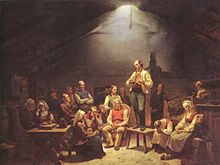Lay preacher

Alay preacheris apreacherwho is notordained(i.e. alayperson) and who may not hold a formal university degree intheology.Lay preaching varies in importance between religions and their sects.
Overview[edit]
Some denominations specifically discourage or disallow lay ministers or lay preachers from assuming certain titles. For example, theUnitarian Universalist Associationreserves the title of "the reverend"for ordained ministers.[1]
TheUnited Methodist Churchauthorized the role of "certified lay minister" (CLM) at its 2004General Conferenceas a non-clergy leadership role, stating that CLMs should not use the title of "pastor"; be addressed as "reverend"; or wearclerical garb(i.e.,the robe, stole or collar).[2]
Lay ecclesial ministryis a similar practice in the Catholic Church. Lay ecclesial ministers serve the church in many ways, assisting priests, but are not ordained.
Examples of lay preachership[edit]
Specific groups of lay preachers, and other groups that encourage lay preachership, include:
- Awakening(Lutheran movement; especially seeHans Nielsen Hauge,Paavo Ruotsalainen,and lay preachers organized byLars Levi Laestadius)
- Methodist local preachers(Great Britain)
- Lay readers,also called licensed lay ministers (Anglicanism)
- Lay speakers(United Methodist Church)
- Plymouth Brethren
- United Reformed Churchpreachers (Great Britain)
- Unitarian and Free Christianaccredited preachers (Great Britain)
See also[edit]
- Lay presidency,celebrating the Lord's Supper while unordained
- Lay brother(lay sister)
- Lay leader
- Practicing without a license
- Universal priesthood
References[edit]
- ^Best Practices for Guest for Preachers in Unitarian Universalist Pulpits(PDF).Unitarian Universalist Association. Summer 2017.Retrieved25 March2020.
Be aware that the title "Reverend" applies to ministers who have been ordained. Some ministers are in candidate status, or otherwise have not earned the "Rev." title.
- ^CLM FAQs: Frequently Asked Questions About Certified Lay Ministry,United Methodist Church (May 25, 2014).
